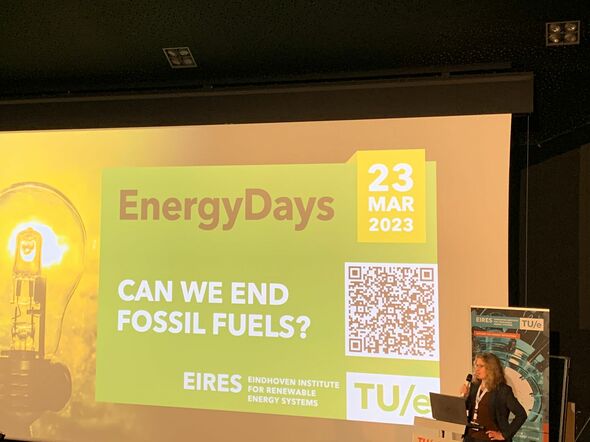Fossil fuel dependence in way of quitting cold turkey
Can we quit fossil fuels? This was the main question at the EnergyDays hosted by EIRES (Eindhoven Institute for Renewable Energy Systems) at De Zwarte Doos yesterday. Different perspectives were voiced by a wide range of scientific speakers and people representing industry and the government. But nobody gave a simple answer to the main question. Opinions vary wildly, but what did become clear is that we need to intervene more quickly and drastically, as well as rapidly decrease our fossil fuel use to slow down global warming.
The fact that climate change and fossil fuel use are increasingly appearing on agendas everywhere was apparent from the fact that the number of tickets given out for yesterday’s EnergyDays greatly surpassed the capacity of the room: around thirty people had to sit on the floor or the stairs. It was said that tickets are usually oversold by around thirty percent because that’s the no-show rate expected by the organizers. But this was definitely not the case yesterday. Plus, a lot of nationwide media had flocked to the event.
IPCC synthesis report
Detlef van Vuuren of PBL Netherlands Environmental Assessment Agency mostly talked about the recently published IPCC synthesis report and the most important points it raises, such as greenhouse gas emissions still being on the increase in spite of the Paris Agreement. “If you want to go down to zero, you need to radically change systems,” Van Vuuren said, and he wasn’t the only one. Other speakers also addressed consumption patterns and how they influence the energy transition.
Using renewable sources of energy makes you dependent on their availability, but the grid always has to stay balanced. This is a major challenge when it comes to replacing fossils by renewables. “But there are several buttons you can turn,” Van Vuuren said. “We can also look at our lifestyles, materials we use in industry, our construction methods, the use of electric vehicles in travel and transport, dealing with energy more efficiently, and so forth. And within those options, you can of course apply different ratios.” Van Vuuren explicitly mentioned the use of coal. “This comes with very high emissions and is easy to replace. We need to mine a much smaller amount of fossil fuels and commit much more strongly to other energy sources. Harro van Asselt, professor of Climate Law & Policy at Utrecht University and the University of Eastern Finland, indicated there are several lock-ins keeping us from quitting fossil fuels altogether. “There is also a lack of transparency regarding the production of fossil fuels.”
Addition instead of transition
Carbon management consultant Margriet Kuijper put an interesting spin on the popular term ‘energy transition’: “We’re not in a transition, but in an addition. We have added and keep adding things to what we already do. We need to face the brutal facts of reality here.” She didn’t beat around the bush, highlighting the need for “more stringent and binding policy to make sure we act quickly enough. Human-caused carbon flows into and out of the atmosphere are in disbalance: the climate’s heating up. We have to move towards a geological net zero.”
EU very dependent
The talk by Jilles van den Beukel of The Hague Centre for Strategic Studies revolved around the financial side of fossil fuels and the position of dependence Europe is in due to the lack of local gas extraction. By way of a graph he showed how in 2022 there was a sudden, major shift in the money ‘leaking’ away from the EU, as the war in Ukraine necessitated buying energy someplace else and our own gas extraction has decreased over time. In the context of the latter, one of the things he mentioned was the discontinuation (or rather: the move to the back burner, ed.) of the gas extraction in Groningen. “This increased Putin’s power. As ‘local options’ for gas only Norway and the United Kingdom remain. The United States, on the other hand, is self-sufficient in its energy needs. What it comes down to is that the EU is still very dependent on fossil fuels and geopolitics are once again an important factor in the energy market. This situation won’t be changing anytime soon and there will be more surprises down the road,” Van den Beukel predicted. “The market will become even more volatile and gas and oil prices will continue to rise.”
Toward geological net zero
The current policy means we’ll heat up by at least 2.5 to 3.5 degrees Celsius, Van Vuuren explained. “It’s happening to us now and we can make a difference, but this requires strict measures.” In his graph showing factors that influence emissions, fossil fuels don’t even fit on the screen, which evoked some giggles from the room. But with this subject, laughing and crying are very close together, as illustrated by the many serious questions asked by those in attendance.
People are worried. Several questions were about how the measures can be distributed across the different nations, preferably in a fair manner so the global south isn’t impacted disproportionately, and about whether fossil companies shouldn’t be punished for their lies (in the past). Kuijper: “If you’re a country that can phase out fossil fuels over the coming years: go for it! This will really differ per country. If you can’t do it fast enough to reach the climate goals, you should already be making plans to clean up the damage. And everyone needs to commit to geological net zero. All that money that left the EU (referring to Van den Beukel’s talk, ed.) for, for example, Saudi Arabia, could have also been used to make our own use cleaner.”
The lectures were followed by a panel discussion between the speakers. Christina Papadimitriou, assistant professor at Electrical Engineering, reiterated that “flexibility is of the essence if we want to change this situation. And we shouldn’t forget the social side (referring to the people that suffer the most from the fossil industry, ed.),” she asserted. In closing the event, President of the Executive Board Robert-Jan Smits shared his own conclusion: “It’s a good idea to team up with smart people to work on the energy transition.”



Discussion